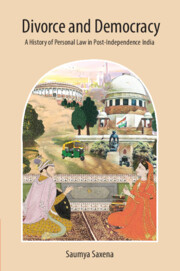Book contents
- Frontmatter
- Dedication
- Contents
- List of Figures
- Acknowledgements
- List of Abbreviations
- Introduction
- 1 Personal Law and the Making of Modern Religion, 1946–56
- 2 Committees, Codes, and Customs: Renegotiating Personal Law, 1957–69
- 3 Social Movements, National Emergency, and the Custody of the Constitution, 1967–79
- 4 Muslim Law, Hindu Nationalism, and Indian Secularisms, 1980–92
- 5 The Court in Context, 1992–2000s
- 6 From the Courtroom to the Courtyard: The Public Life of Personal Law, 2000–Present
- Conclusion
- Glossary
- Bibliography
- Index
5 - The Court in Context, 1992–2000s
Published online by Cambridge University Press: 20 May 2022
- Frontmatter
- Dedication
- Contents
- List of Figures
- Acknowledgements
- List of Abbreviations
- Introduction
- 1 Personal Law and the Making of Modern Religion, 1946–56
- 2 Committees, Codes, and Customs: Renegotiating Personal Law, 1957–69
- 3 Social Movements, National Emergency, and the Custody of the Constitution, 1967–79
- 4 Muslim Law, Hindu Nationalism, and Indian Secularisms, 1980–92
- 5 The Court in Context, 1992–2000s
- 6 From the Courtroom to the Courtyard: The Public Life of Personal Law, 2000–Present
- Conclusion
- Glossary
- Bibliography
- Index
Summary
Let me interpret the decision of the Supreme Court for you…. It does not ask us to stop the Karseva [in Ayodhya]. In fact, Supreme Court has given us the right to perform Karseva. Tomorrow, by performing Karseva we are not violating the order of the Court, we are honouring it. It is true that the court has said do not do any construction work. But the Supreme Court has said that we can sing bhajans, and perform kirtan. Now, one person alone cannot sing bhajans, and kirtan cannot be performed standing upright. Until when will we keep standing? There are sharp stones emerging from the ground. We will have to make the land hospitable, a yagya will need to be organised and the ground will have to be levelled.
—Atal Bihari Vajpayee, 5 December 1992, LucknowOn the morning following Vajpayee's speech on 6 December 1992, approximately 150,000 karsevaks (volunteers) armed with sickles, sticks, and stones attacked the Babri Masjid, a sixteenth-century mosque. Riots between Hindus and Muslims broke out in Ayodhya and spread to neighbouring districts, then to cities across India, and the invocation of Supreme Court's order in public speeches somehow made it complicit in the event of the demolition.
All parties in the Indian Parliament laid claim to the interpretation of ‘secularism’ in their response to the demolition. Since almost all political action, however religiously tinted, could be couched in the language of secularism. Even in the demolition of the Babri Mosque, the karsevaks saw themselves vindicated by a recourse to secularism—as an ideology deemed consistent with destroying a ‘colonial’ or ‘Mughal’ symbol. While the period indeed witnessed a democratic upsurge with challenges to the Congress Party's domination and the mushrooming of regional political parties, there was a crisis of the legitimacy of state structures as the calls for a Hindu rashtra also became plausible with the BJP's ascent to power in the late 1990s.
To make themselves more palatable to citizens who self-identified as secular, the BJP undertook considerable effort to appropriate judicial instruments to legitimize their claims to governance. This was particularly so because organizations such as the RSS, which constituted the BJP's support base, had a long and hostile history with the law.
- Type
- Chapter
- Information
- Divorce and DemocracyA History of Personal Law in Post-Independence India, pp. 230 - 277Publisher: Cambridge University PressPrint publication year: 2022
- 1
- Cited by



